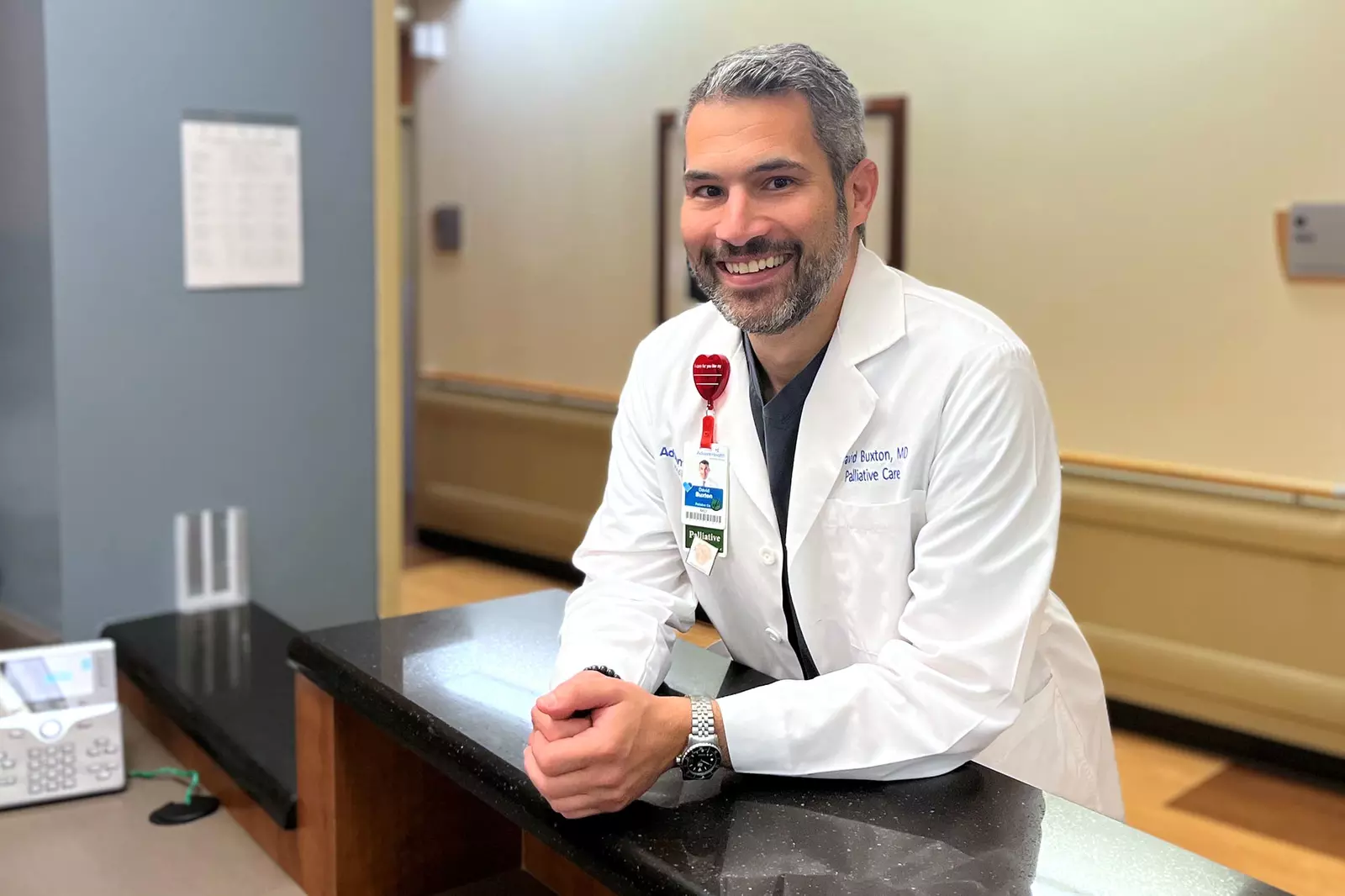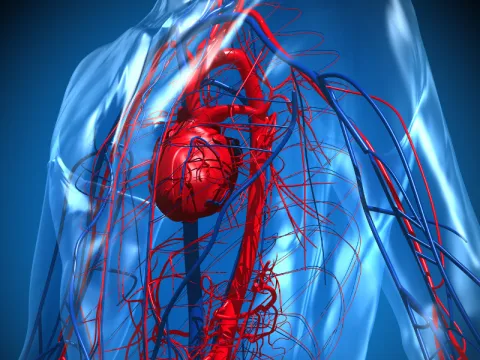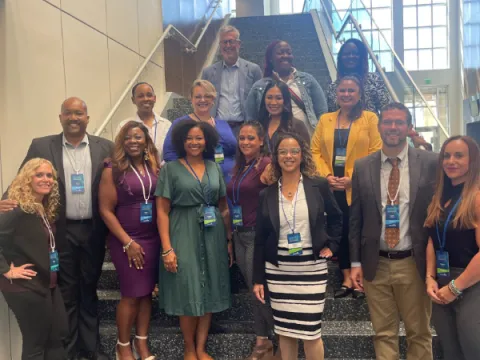- AdventHealth
This Physician's View opinion piece is written by David Buxton, M.D., Executive Director of Palliative Medicine for the AdventHealth Central Florida Division – South Region.

When someone asks you, “How are you doing?” your instinctive response is probably to say, “Oh, I’m okay.”
Let’s be honest - many of us are not okay. The pandemic has taken a toll on all of us in health care, especially those of us on the frontline. We were asked to care for people who were seriously ill with COVID-19 and provide support to their families, all while grappling with our fear of a deadly virus that could harm not just us, but also our families. And after an initial burst of support from the public, the appreciation dwindled; but we had to keep working.
It’s understandable many of us in health care are showing more wear and tear than usual. We may not be able to “get back to normal,” but we can take steps to help ourselves establish a “new normal” that’s healthier than where we are now.
Acknowledge the Reality of the Stress Effect of Trauma
The stress most clinicians are experiencing now is very different from the burnout traditionally experienced among many people in the health care field. For some individuals, the stress of COVID could have even pushed them into the DSM-V (Diagnostic and Statistical Manual of Mental Disorders, Fifth Edition) diagnosis of Posttraumatic Stress Disorder (PTSD). Recognizing symptoms like nightmares, flashbacks, irritability and hypervigilance should alert yourself, or a colleague, to get an evaluation by a professional.
Recent research also tells us there’s a compounding effect in trauma, raising the risk of PTSD and the severity of the diagnosis. For example, if you experience one episode, then another one, you increase your chances of PTSD. As we all worked through multiple surges of COVID, our risk stratification rose with every surge.
As physicians and health care workers, it doesn’t help that we can’t avoid the hospital or other stress triggers. We’re expected to return to the scene of our trauma over and over again. We had to enter rooms where our patients died of COVID to see even more patients with this virus, again and again. In addition, we had to care for them, suppressing the feelings we are experiencing. Now, we face a different dilemma. We continue to summon our compassion, while people all around us have decided the pandemic is over. Bottomline, we are forced to face our triggers every day.
A Recipe for Healing
In order to heal from any trauma, you must go back to the basics.
On trauma:
David Buxton M.D., AdventHealth Central Florida Division – South Region Executive Director of Palliative Medicine
As a palliative care physician and a child and adult psychiatrist, here are a few ideas for colleagues to focus on as they heal from this unavoidable trauma.
Lead a Healthy Lifestyle
There are several areas in your day-to-day life you can pay attention to and affect a healthy change. These include:
Your Diet
Are you eating, and if so, are you eating three meals a day? Is your diet comprised of nutritious foods? Paying attention to how and what you eat will give your body the nutrients it needs to function properly.
Your Sleep Habits
Are you getting enough sleep? Too many providers try to make it on five hours of sleep per night, but it may not be enough. A better game plan is to make sure you’re well-rested. That might mean starting an evening meditation to help you wind down before bedtime or making an honest re-evaluation of sleep hygiene and getting rid of bad habits (like doom-scrolling through your phone at night).
Your Priorities
Are you finding meaning in life? Are you engaging with those who are important to you? Are you involved in activities that bring you joy or give you a sense of satisfaction? Many of us stopped doing those things during the pandemic, but it’s time to rediscover and prioritize them. Finding meaning in life will help you stay grounded and is essential to improved well-being. In fact, simple endeavors like journaling or exercise might help you as well.
Use the Buddy System
In the military, soldiers have battle buddies who check in on them, making sure they have their helmets and other vital equipment. The work we do as clinicians is emotionally heavy and having a buddy could go a long way towards feeling a sense of belonging and wholeness. The buddy can check in with you and identify signs of exhaustion and when it’s time for a break – and you can return the favor, keeping each other healthy.
Do you have a friend or team member whom you trust to check in on you—and to be honest with you in their assessment of your mental state? If not, it may be time for your team to talk about how to monitor each other for signs of distress.
Seek Care for Yourself
In my psychiatry training, we were encouraged to seek out psychotherapy for ourselves, so we would be less likely to let our own issues color the care we provided to our patients.
There’s a significant emotional component to healthcare, and it can weigh heavily on clinicians. That means you may need to find a mental health care professional who can help you cope with the strain related to the job as well as recover from the stress of the pandemic. When you can do this, you’ll rediscover the passion you have for the work you do.
Not sure where to start? Try your employer’s Employee Assistance Program (also known as an EAP), which likely offers free and confidential, short-term counseling sessions and makes referrals for ongoing care and follow-up services.
At AdventHealth, the organization developed tools and resources specific to physicians and advanced practitioners and launched a Spiritual Care Hotline at Call833-258-2414, a free and completely confidential hotline to provide prayer, support and resources.
Furthermore, within the six counties of the AdventHealth Central Florida Division, all credentialed physicians and advanced practitioners – and their family members – can receive six complimentary counseling sessions.
Take a Break
As clinicians, we need to take care of ourselves so that we can keep providing this critically important care to patients who need it. If we are run down, exhausted, and burned out, we aren’t able to function effectively.
Professors take sabbaticals to give themselves some time and space away from the classroom and focus on personal development. If your stress or trauma is disruptive to your life, it may be worth even considering taking a sabbatical from your work as a clinician.
I realize this could be a shocking suggestion, but I would much rather you take a break for six months and return, than see you walk away from the field of medicine altogether. This is especially true for physicians and nurses; there are less providers now and we can’t afford to lose anyone.
Give yourself grace
Ultimately, you have to give yourself some grace. The last few years have been incredibly difficult for health care providers. You probably are not the same person you were before the pandemic began. You may need to pay extra attention to your emotional and spiritual health going forward. And that’s okay.
At AdventHealth, the Center for Physician Wellbeing (CPW) provides counseling and coaching services for AdventHealth physicians, advanced practice providers and their families. The CPW also creates unique, wellbeing focused events and workshops. All credentialed and employed physicians and APPs receive six complimentary counseling or coaching sessions per year, which are also redeemable by family members.
By paying attention to triggers, focusing on leading a healthy lifestyle, recognizing potential symptoms of PTSD and seeking help, health care workers can slowly start to heal from the trauma the pandemic has brought on the medical community.
David Buxton, M.D., is a Distinguished Fellow of the American Psychiatric Association (DFAPA), Fellow of the American Academy of Child & Adolescent Psychiatry (FAACAP), and Fellow of the American Academy of Hospice and Palliative Medicine (FAAHPM). He currently serves as the executive director of palliative medicine for the AdventHealth Central Florida Division – South Region which includes Orange, Osceola and Seminole counties.



